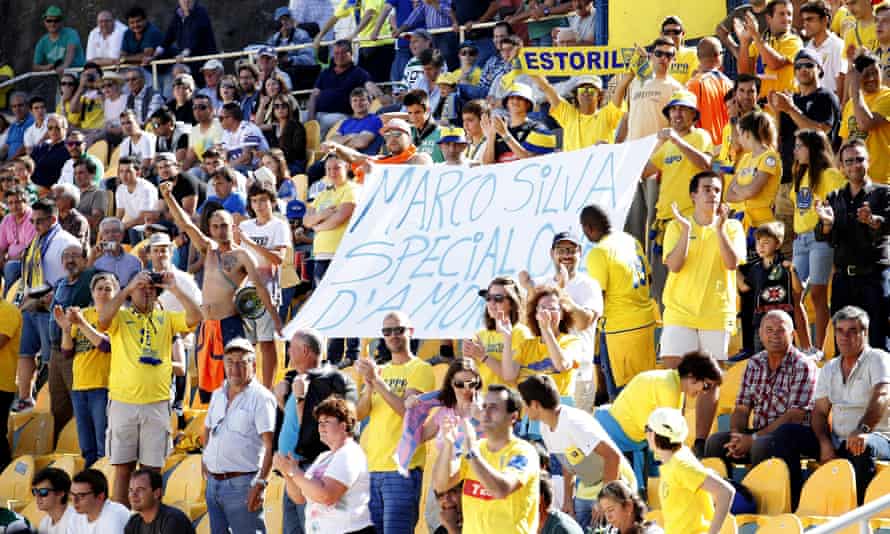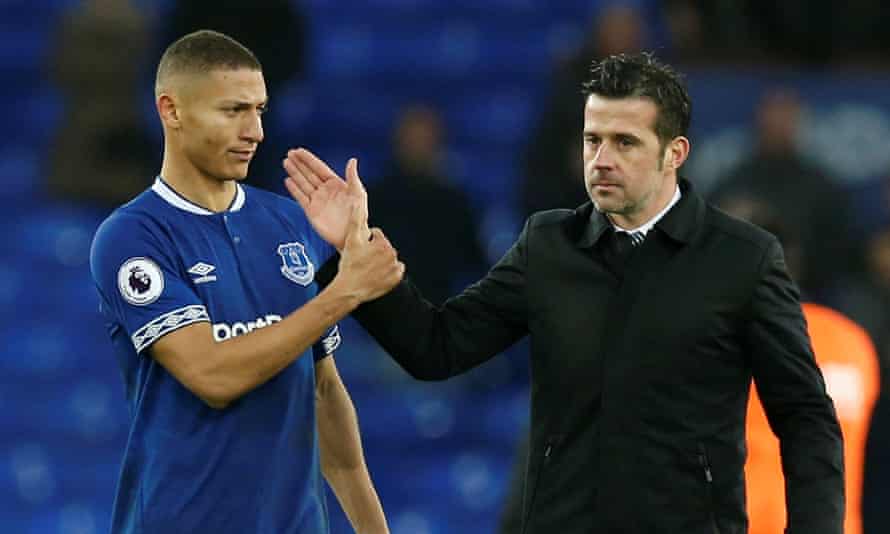Marco Silva arrived in England in January 2017, a surprise appointment for Hull, who were in a Premier League relegation fight. Things improved markedly under the Portuguese manager but not enough to avoid the drop and he soon found himself at Watford and then Everton.
In December 2019 it was all over, a 5-2 defeat by Liverpool leading to his dismissal at Goodison Park. It was a rollercoaster ride, three clubs in 35 months and barely time to take stock. Now the time for reflection has come. The 43-year-old is back in Portugal, studying the game and studying German.
“Yes, I’m studying a new language and learning how to improve myself,” he says as we talk on Zoom. “I want to be ready for the next challenge, always. I watch many games in many different leagues. I always watch the Premier League but not only that league: you have to be ready, I never stop.”
It has been a tumultuous month in football, the European Super League being born and dying a brutal death within 48 hours. For Silva, who made his managerial name at Estoril, a small-town club punching above their weight the plans made no sense.
“It is very simple: I’m totally against the Super League. I cannot understand how such a proposal for football could emerge. Sport is competition and merit, you have to deserve the positions in the respective leagues based on the results,” he says. “This format would have taken away the true meaning of football. But the most important thing is the emotion and the passion of the fans: if they do not feel that this is right it is unthinkable to carry out such a project. Football belongs to the fans and their reaction across Europe and in particular in England has proved this again.”

Silva spent six years as a player at Estoril before, in 2011, becoming the director of football. However, it did not take long before he was made manager of the team, then 10th in the second tier. In less than three full seasons, he got them promoted and then qualified for the Europa League by finishing fifth.
The secret at Estoril, according to Silva, was the bond with the fans but also the togetherness between the players and the member of staff. “I accepted [becoming a coach so soon after ending his playing career] because I knew all the players and the board. The staff is so important. Someone like a kit man can be decisive for a club’s success.
“I’ve been lucky to have had a wonderful relationship with all these people in Portugal as well as in the Premier League and will always be grateful. In particular, I spent a total of nine years as a player and coach with the kit man at Estoril … we created an indelible relationship.
“We have kept in contact since I left and many years after leaving Estoril I came back to have lunch with him near the stadium. I knew he was not having a very easy time so I wanted to meet him and offer him my support. These kinds of relationships with people are always important: you win with them, because of them.”
It is questionable whether Silva had been offered a job in England if it had not been for a certain José Mourinho. How important is he for Portuguese coaches? “Mourinho has won everything there is to win in many different countries, that’s his story. He is the most important coach in Portugal and is a reference for everyone because he has opened a window to the world of the ‘Portuguese school’ of coaches.”
At Hull, he worked with Andy Robertson – “he had a unique skill: he enjoyed working really hard” – and Harry Maguire (“he came from Sheffield [United], very young but with a lot of personality”) and he is not surprised how well they have done after leaving the club.
For Silva, the Hull adventure ended abruptly after they failed to stay up with the Portuguese taking over at Watford. After an impressive start at Vicarage Road the team’s form dipped after Silva was approached by Everton. On 21 January 2018 he was dismissed and there are regrets but also positive memories, especially when it comes to the Richarlison transfer.

“We were looking for new signings during our pre-season camp in Austria,” he says. “After a lot of research, we noticed Richarlison at Fluminense as an opportunity and I still remember a whole night spent watching so many games of him. We decided to really try to buy him, even though it was never easy for young Brazilians to get used to the Premier League. But I was convinced because Richarlison is not a typical Brazilian guy, he has something European in his maturity.
“The negotiation started in the middle of the week so when I came back from Austria I called his agent, whom I already knew. He tells me: ‘I’m sorry Marco but Richarlison will fly to the Netherlands on Monday and sign with Ajax.’ I immediately replied: ‘No, you have to stop everything. I want Richarlison at all costs at Watford.’ So I get Richarlison’s number, phone him and speak to him in Portuguese.
“He tells me: ‘I am joining Ajax’ and I said: ‘No, you are not, you are coming to Watford!’ I told him that I would support him with everything. I said that the Premier League is bigger than the Eredivisie. Richarlison sounded happy and then I had to convince the Watford owner to match Ajax’s offer and spend a lot of money on Richarlison, a very young Brazilian boy who had never played in Europe before. Together though we managed to stop Richarlison’s flight to the Netherlands and two days later he arrived at the Watford training ground.”
Richarlison was a success and joined Silva at Everton the following summer. Again Silva started well, Everton finishing eighth in the league in his first season in charge, not far away from qualifying for the Europa League. The second season was tougher and Silva left in December. He has analysed his time at Goodison and says he will learn from it.
“We changed a lot of things at the club and the first season was obviously very good. One of the things we did was to putting up messages/statements that showed every player what it meant to be an Everton player. The main one I remember was one that we put at the top in the dressing room: ‘Once Everton has touched you, nothing will be the same.’ Those kind of feelings are crucial for the team and we also wanted those sort of statements in the tunnel leading to the pitch to give an impact to the players and to reinforce the identity of the club.
“The second season was more difficult. We sold Idrissa Gueye to PSG and he had been fundamental for us. The replacement was Jean-Philippe Gbamin but unfortunately he got injured and we never had him available. We also missed Kurt Zouma as he had returned to Chelsea. We started well but there were injuries and the results suffered because of that. That’s football and the club decided to make a change. I fully respected the decision and my relationship with everyone at Everton remains excellent. I will always wish the best to the club, as well as to [Carlo] Ancelotti”.
The Fiver: sign up and get our daily football email.
Silva may return to England one day or may find himself in another league. “One of my priorities is to return to England because the Premier League has a unique atmosphere and is the most competitive league in Europe,” he says. “I’m also studying German because I want to be ready if some projects come from other countries as well. I don’t know if that would be now or in the future: the Bundesliga is reaching a very important level, it is in constant growth.”
Whether it will be England, Germany or another country, Silva is determined to make his mark again.
from Football | The Guardian https://ift.tt/3eBxBOm
via IFTTT

No Comment